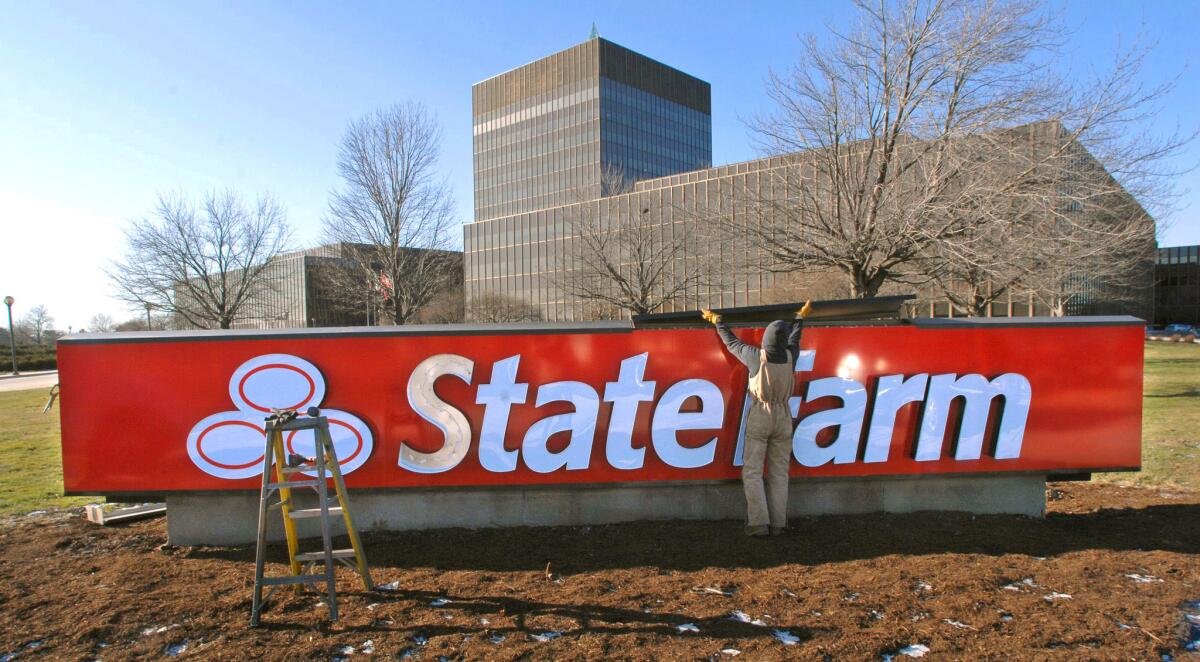Judge says State Farm shouldn’t have to cut homeowner rates in blow to insurance commissioner

- Share via
California’s insurance commissioner erred in ordering State Farm to lower homeowners and renters insurance rates in California, a judge ruled Friday in a decision that sidestepped an unresolved question over the reach of Proposition 103 — but still drew criticism from the initiative’s author.
Insurance Commissioner Dave Jones in 2016 accused State Farm of excessively profiting from those insurance policies and ordered the Bloomington, Ill., company to not only lower rates an average of 7%, but also to cut them retroactively to mid-2015 and issue refunds to customers.
State Farm sued over that order, arguing that Prop. 103, the landmark insurance-regulation law approved by California voters in 1988, does not give the commissioner the authority to order retroactive rate cuts. The company lowered its rates but has not paid the refunds Jones demanded, pending the outcome of the lawsuit.
The decision handed down in the case Friday by San Diego Superior Court Judge Katherine Bacal does not address the issue of retroactive cuts. Rather, Bacal said Jones erred in calling for a rate cut in the first place by incorrectly calculating the company’s profits, siding with the insurer on that key point.
At issue is whether the company’s insurance rates are reasonable given State Farm’s costs, claim payouts and investment returns. Under Prop. 103, the state Department of Insurance must approve insurance rates to make sure they are enough to allow companies to cover claims but not so high that they generate excessive profits.
State Farm had argued that the department improperly included the higher-yielding investment returns of subsidiaries other than the State Farm unit that writes homeowners insurance policies in California when it determined the company’s rates were too high.
The California unit makes more conservative investments than other State Farm subsidiaries, so lumping the returns together creates the incorrect appearance of a more profitable investment portfolio that does not support the higher rates, Bacal wrote. Her order did not address whether State Farm will be able to raise its rates going forward.
Jones said in a statement that he was disappointed by Bacal’s order.
“I believe strongly that our regulations are lawful under Proposition 103 and will continue to defend our regulations in order to protect consumers from State Farm gaming the system by charging rates that are excessive and unjustified,” he said.
Representatives for State Farm did not return calls for comment.
Harvey Rosenfield, the author of Prop. 103 and founder of advocacy group Consumer Watchdog, said he will probably ask Bacal to reconsider Friday’s order and that any decision on the matter will probably be appealed. That could postpone any final determination on State Farm’s rates.
He said that if Bacal’s order stands, it would make it easier for big insurance companies to make an end run around Prop. 103 and charge Californians more. He sees the case as part of a larger trend of insurance companies pushing to weaken the law.
“All of State Farm’s decisions are directed by one company that’s a national company,” he said. “This would open a huge loophole and allow every insurance company to manipulate their finances to demand excessive rates.”
But Rex Frazier, president of the trade group Personal Insurance Federation of California, said State Farm’s California homeowners business is truly separate from the rest of the company’s business lines and that State Farm has good reason to structure its business that way.
He said the company split off its homeowners business in the state after the Northridge earthquake, which saddled insurers with huge payouts and led to the creation of the public California Earthquake Authority.
While the state-sponsored insurer underwrites the majority of earthquake insurance in California, it can still demand multimillion-dollar backstop payments from insurance companies in the event of a major earthquake. That created an “uncontrollable risk that [State Farm] didn’t want to subject their national capital to,” Frazier said.
Though Bacal’s order looks like a win for State Farm, Frazier said that the company and other insurers would like to see a final judgment on the broader question about the boundaries of the commissioner’s authority under Prop. 103.
In 2016, the department started sending letters to insurers saying it believed their rates were too high and that if they did not act to lower rates by a set date, the department may ultimately order them to cut rates retroactively to that date. Frazier said insurers are keen to know whether the department has the authority to make such a threat.
“Certainty is better than uncertainty,” he said. “In the meantime, I assume the department will continue to issue these communications to insurers.”
Follow me: @jrkoren
More to Read
Inside the business of entertainment
The Wide Shot brings you news, analysis and insights on everything from streaming wars to production — and what it all means for the future.
You may occasionally receive promotional content from the Los Angeles Times.











